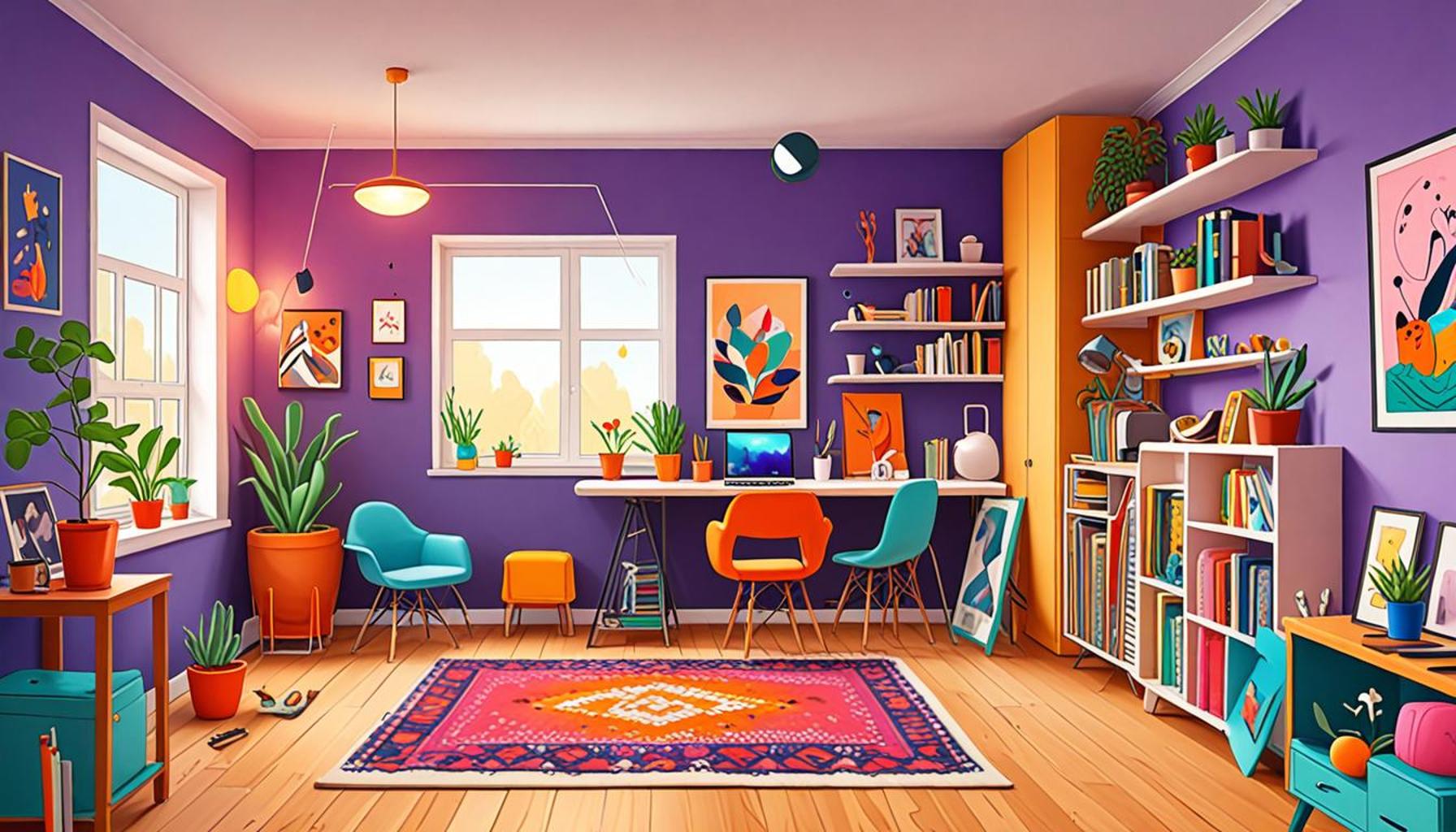Practical Tips to Optimize Study Spaces Boost Productivity Now

Maximizing Your Study Environment
In the pursuit of academic success, the value of a well-optimized study space cannot be overstated. A carefully designed and organized environment can significantly enhance your ability to focus and retain information. Consider the following strategies for transforming your workspace into a productivity powerhouse:
- Lighting: Natural light is ideal, as it boosts mood and energy levels. Research has demonstrated that exposure to daylight can stimulate alertness and enhance cognitive performance. If your study area lacks sufficient windows, incorporate bright task lamps for evening study sessions. LED bulbs are particularly effective as they mimic daylight and help reduce eye strain.
- Organization: Keep your desk clutter-free to minimize distractions. Utilize organizers, drawer dividers, and labeled folders to create a clear and accessible workspace. Employing a digital filing system can also help keep your notes and materials organized in a virtual format, making it easier to locate resources quickly.
- Comfort: Invest in an ergonomic chair and desk designed to support long study hours while reducing fatigue. Adjustable desks that allow you to alternate between sitting and standing can also enhance comfort and focus. Additionally, consider using a supportive cushion for added lumbar support.
Understanding the impact of your surroundings is crucial when it comes to studying effectively. A few small adjustments can lead to a more efficient study routine, which is essential for students aiming to excel. Studies have shown that a well-structured environment can boost focus by up to 30%, making even minor changes to your space worthwhile.
Moreover, personalizing your study area can greatly increase motivation and engagement. Surrounding yourself with inspiring quotes, plants, or artwork can foster a sense of ownership and creativity. For instance, a small potted succulent not only decorates your desk but can also improve air quality and adds a refreshing vibe. Alternatively, organizing a vision board with images and phrases that resonate with your goals can continually inspire you as you study.
As you explore the various ways to enhance your study area, you will uncover the realization that productivity isn’t merely about hard work—it’s equally about cultivating the right atmosphere. Dedicating time to create a study environment tailored to your personal preferences can contribute significantly to your academic achievements. Encourage yourself to experiment with different elements, then monitor how they affect your focus and retention. Your ideal study space might be just a few adjustments away, waiting for you to discover its full potential.
CHECK OUT: Click here to explore more

Creating a Distraction-Free Zone
Central to optimizing your study space is the necessity of a distraction-free environment. In a world brimming with interruptions—from smartphone notifications to the chaotic ambiance of a busy household—your study area should be a sanctuary dedicated solely to learning. To cultivate such an environment, consider implementing the following practical strategies:
- Minimize Digital Distractions: Your devices, while essential for research and communication, can also be significant sources of distraction. To combat this, use productivity tools like Focus@Will or Forest that help block distracting notifications. Additionally, try designating specific times for checking messages and social media to maintain your focus during study hours.
- Sound Control: Depending on your personal preference, silence might be golden or music might be the key to concentration. Experiment with different applications that provide ambient sounds or playlists, such as Noisli or Spotify’s study playlists, to find what helps you focus best. Alternatively, noise-canceling headphones can also be beneficial in drowning out any background noise.
- Set Boundaries: Whether you’re studying in a communal space or at home, communicate your study hours to those around you. Encourage family members or housemates to respect your space and time, perhaps even establishing a “do not disturb” signal that indicates you’re deep in concentration.
Another effective method to enhance productivity is to establish a defined study schedule that aligns with your most productive hours. Research shows that many individuals perform best in the late morning or late afternoon, while others may find their stride later in the evening. Identify your peak hours and plan your most challenging subjects during those times to take full advantage of your mental acuity.
Additionally, maintaining a consistent study routine can foster a sense of discipline and predictability, allowing your brain to recognize when it’s time to shift into study mode. This habitual practice, when combined with a well-established physical study environment, creates a dual approach to maximizing productivity.
Lastly, consider incorporating elements of biophilic design into your study space. Studies have demonstrated that plants can improve concentration and enhance cognitive function. Simple additions like a peace lily or a snake plant can elevate your mood and establish a more inviting atmosphere. Even the mere presence of greenery can lower stress levels, which is essential for effective studying.
By thoughtfully cultivating a distraction-free zone that caters to your unique learning style, you set yourself up for greater academic success. These small but impactful changes can lead to a noticeable improvement in your focus and efficiency, ultimately allowing for a more profound and enriching study experience.
| Category 1 | Category 2 |
|---|---|
| Ergonomic Furniture | Enhances Comfort and Focus |
| Natural Lighting | Boosts Mood and Energy Levels |
| Organizational Tools | Reduces Clutter and Improves Time Management |
| Color Psychology | Encourages Creativity and Productivity |
When it comes to optimizing study spaces for enhanced productivity, ergonomic furniture is a critical element. Investing in chairs and desks designed to support proper posture can significantly impact comfort levels, allowing for longer and more focused study sessions. Additionally, incorporating natural lighting into the study environment can work wonders for mood enhancement and energy levels, fostering a positive mindset crucial for effective learning.Another key aspect is integrating organizational tools like planners and storage solutions to minimize clutter. A well-organized space can drastically improve time management, ensuring that study materials are easily accessible. Moreover, understanding color psychology can aid in setting the right ambiance; for instance, blue tones are often believed to boost creativity, making them ideal for brainstorming sessions. Exploring these elements further could reveal more personalized approaches for crafting your own optimal study space.
CHECK OUT: Click here to explore more
Organizing for Success
Another significant aspect of optimizing your study space involves effective organization. A cluttered study area is often synonymous with a cluttered mind, which can hinder your ability to focus. Implement these strategies to create a neatly organized environment that promotes productivity:
- Declutter Regularly: Set aside time each week to declutter your study area. Remove unnecessary items that can divert your attention. A clean, minimalist workspace helps minimize distractions, allowing your brain to concentrate solely on the task at hand.
- Utilize Organizational Tools: Invest in organizational tools such as desktop organizers, shelves, and labeled binders. Use color-coded notes or tabs to make important information easy to access. This not only keeps your materials in order but also makes studying more efficient as you quickly find what you need.
- Create a Study Checklist: Every time you begin a study session, have a checklist of tasks to complete. This could include specific chapters to read, problems to solve, or topics to revise. Checklists streamline your focus and provide a clear path to your goals, making your study time feel more structured and purposeful.
Lighting and Ergonomics Matter
The physical aspects of your study space play a crucial role in your overall productivity. Adequate lighting and ergonomic furniture can significantly impact how effectively you study:
- Invest in Quality Lighting: A well-lit room can enhance your mood and focus. Natural light is ideal, so position your study area near a window if possible. If your environment lacks good lighting, opt for adjustable desk lamps that provide ample light without causing eye strain.
- Ergonomic Design: Comfort is paramount during study sessions. Utilize ergonomic chairs and desks that promote good posture. An uncomfortable setup can lead to physical discomfort, distracting you from your work and causing fatigue. Aim for a seating arrangement that allows you to maintain a straight posture, with feet flat on the ground and screen at eye level.
Fostering a Motivating Atmosphere
A study space that reflects your personality and inspires you to work can be a powerful motivator. Here are some tips to enhance the overall vibe of your environment:
- Incorporate Inspirational Elements: Decorate your study space with items like motivational quotes, artwork, or vision boards. These elements can serve as daily reminders of your goals and aspirations, keeping you energized during long study sessions.
- Create a Comfortable Ambience: Consider adding soft furnishings such as cushions or throws to make your space cozy and welcoming. A comfortable environment encourages extended periods of productivity, making it easier to dive into your work.
- Personal Touches: Customize your study area with personal items, such as photos or mementos that evoke positive memories. Familiar and comforting surroundings can elevate your mood, creating a space where you genuinely enjoy spending time.
By embracing these organizational techniques, maintaining a comfortable workspace, and fostering a motivating atmosphere, you create a potent study environment. Enhancing your study space not only boosts your productivity but also makes the learning process more enjoyable and engaging. Each of these elements works in concert to support a fulfilling academic experience, allowing you to perform at your best.
SEE ALSO: Click here to read another article
Conclusion
In today’s fast-paced educational landscape, the importance of an optimized study space cannot be overstated. By applying the practical tips outlined in this article, you can transform your study area into a haven of productivity. Remember, organization is key: decluttering regularly and utilizing the right tools will streamline your study sessions and minimize distractions. Ensuring your workspace is well-lit and ergonomically designed is equally important, as it not only promotes physical comfort but also enhances mental clarity.
Furthermore, fostering a motivating atmosphere through personal touches and inspiration can make your study space a place of creativity and engagement. By mixing comfort with effective study techniques, such as utilizing checklists and setting clear goals, you empower yourself to achieve greater academic success. The interplay between a well-organized, comfortable, and inspiring environment will not only boost your productivity but also enrich your overall learning experience.
As you embark on this journey to enhance your study space, keep in mind that every small adjustment can contribute to significant gains in focus and motivation. Explore different styles and setups, experiment with what resonates with you, and feel free to adapt continually. Your ideal study space is unique to you, and finding the perfect balance can turn the act of studying into a more enjoyable and fulfilling pursuit. Begin optimizing your study space today, and watch how it positively impacts your productivity now and in the future.


